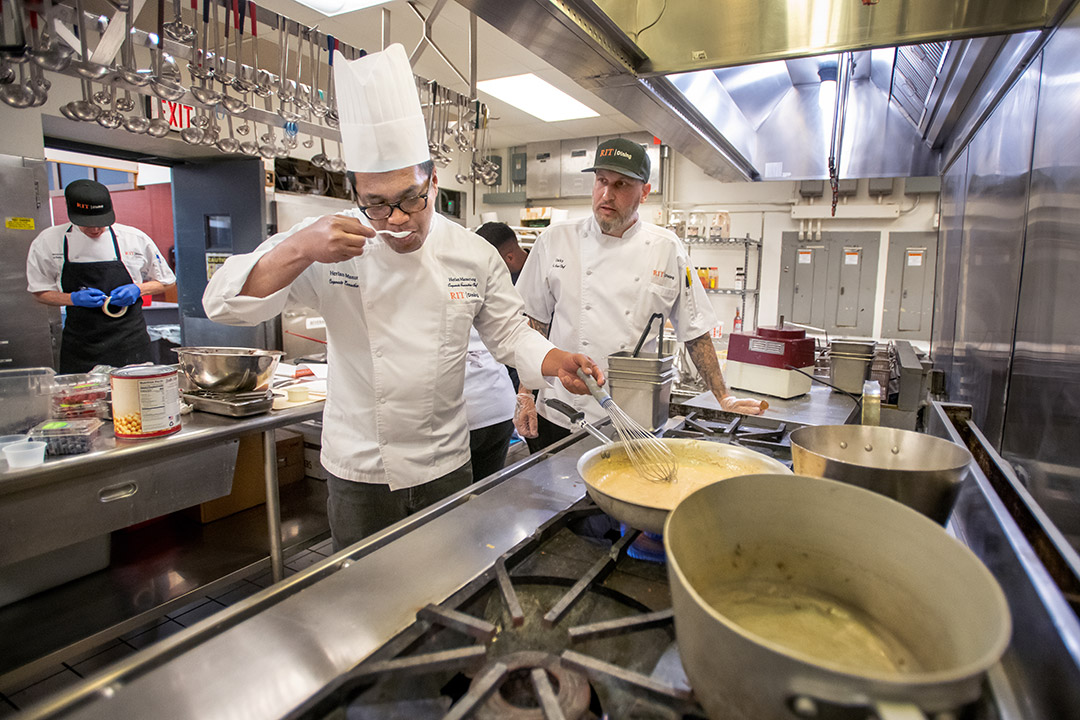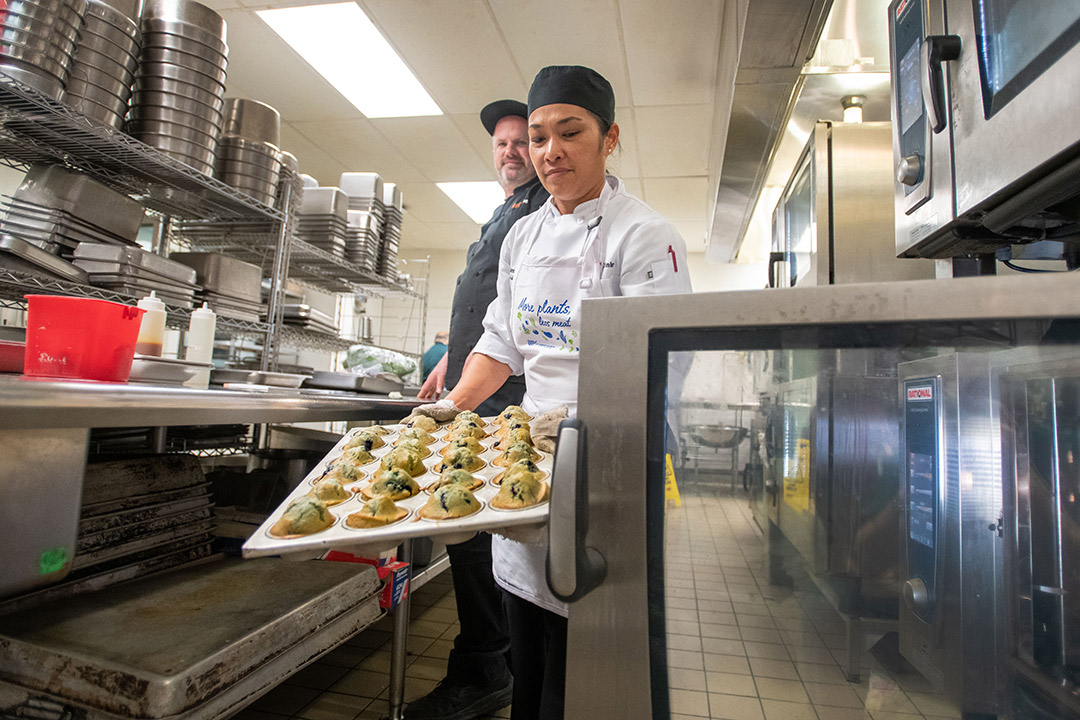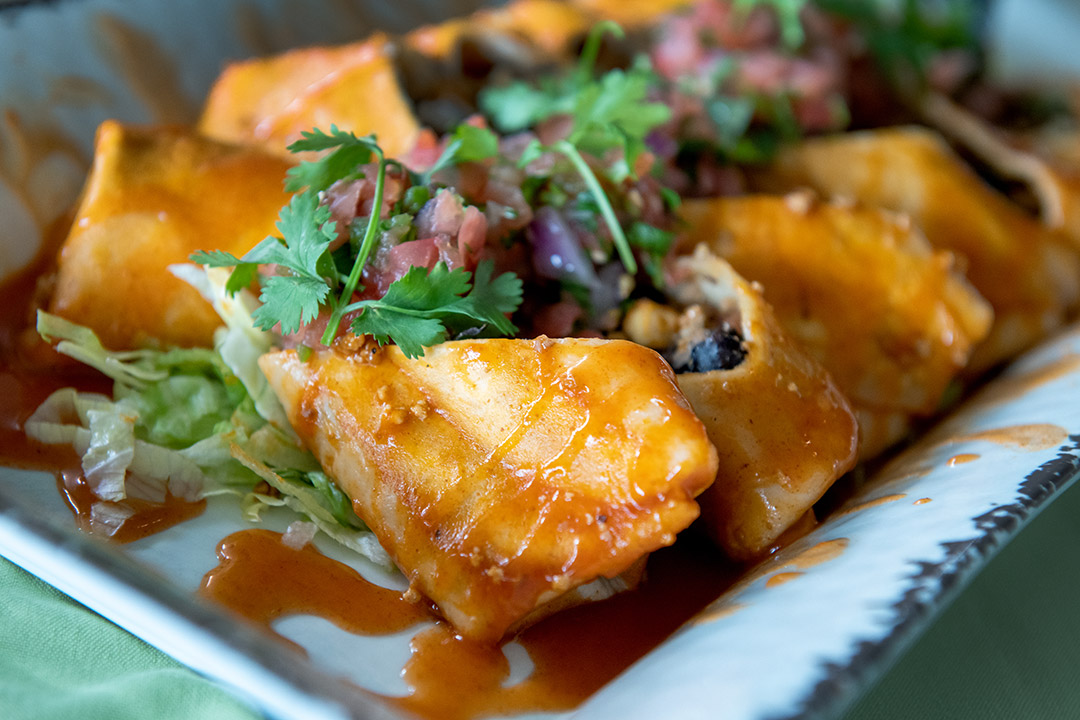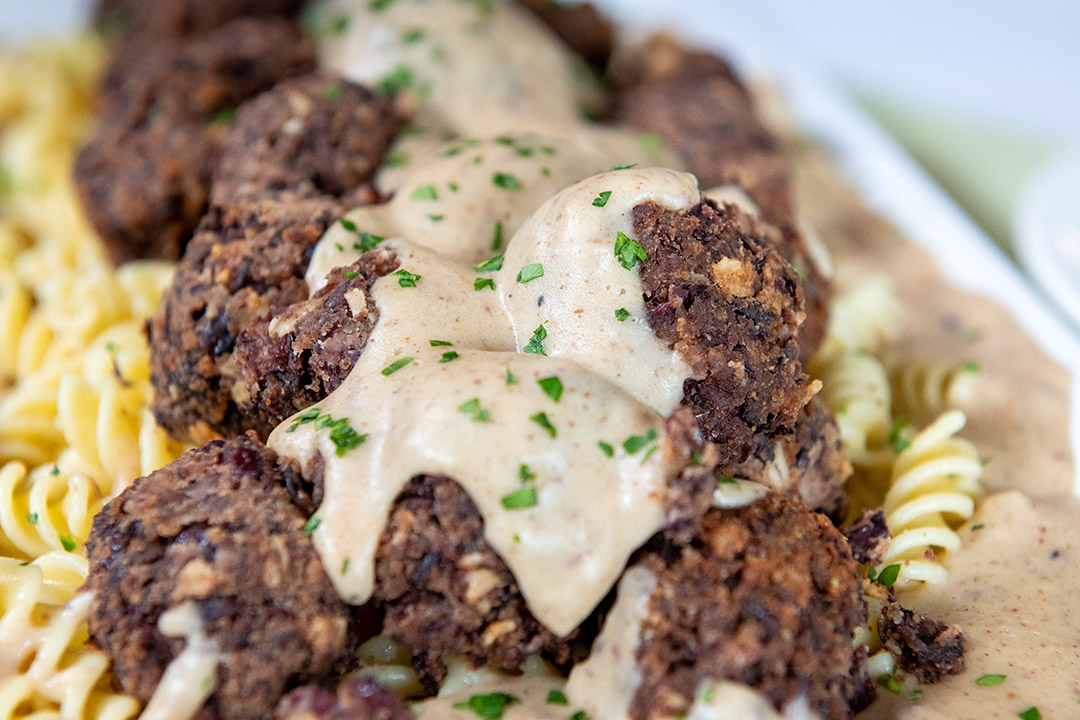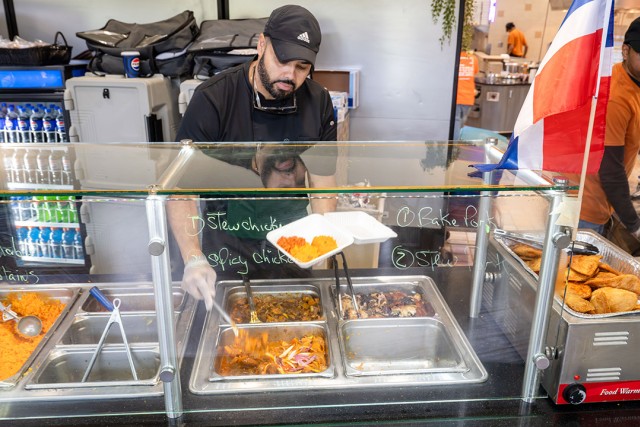More plant-based food headed to RIT
MOU with Humane Society of the United States aims for 50 percent plant-based meals by 2025
Carlos Ortiz
Herlan Manurung, center, RIT’s corporate executive chef and associate director of RIT Dining, experiments with recipes created with plant-based ingredients in an attempt to offer more options in cafeterias to help reduce the university’s carbon footprint and to improve student health.
Greater food options will be available for Rochester Institute of Technology students, faculty, and staff, as the dining staff explores ways to increase plant-based meal options.
Carlos Ortiz
Hellen Bitetti, chef de cuisine at RIT, removes muffins from an oven during a training session to test plant-based recipes.
“We have been making more plant-based options available because students have been asking for more plant-based choices,” said Herlan Manurung, RIT’s corporate executive chef and associate director of RIT Dining. “Our goal is to provide diverse menus that meet dietary needs and preferences and become more sustainable. We’re never going to get rid of meats as options, but we want our customers – students, faculty, and staff – to have variety and know that we are listening and working to elevate their dining experience.”
He said students brought up the subject during meetings with Student Government, as well as student Paw Prints petitions and from members of the RIT Vegan Club.
Club President Karaline Foley, a fourth-year management information systems major from Stoneham, Mass., is thrilled about RIT’s decision to offer more plant-based meals. She hasn’t eaten meat in more than eight years.
Carlos Ortiz
Chorizo tofu enchiladas were prepared during a training session at RIT to incorporate more plant-based foods the menus. RIT has pledged to offer at least 50 percent plant-based meals by 2026 to improve health and lower RIT’s carbon footprint.
Foley said her club members have enjoyed some of the vegan options currently available, such as the tempeh BLT at Midnight Oil. “While there are multiple vegan meal options available that we love, there is not enough variety overall,” she said.
She said freshmen with meal plans are 100 percent reliant on the food options on campus, so those students needed to rotate through the same couple of meals every day. But, she says, the new initiative makes her proud to be attending a university that cares about sustainability and their students’ health and well-being.
“Our club has been advocating for more plant-based meal options on campus for a long time now, so it feels great to see that our efforts have been noticed. We appreciate all of the RIT staff who are working hard to make this a reality. I can’t wait to try out the new options. I’m sure they will be delicious,” Foley said.
Carlos Ortiz
Chocolate avocado pudding was prepared during a training session at RIT to incorporate more plant-based foods the menus
Earlier this year, RIT officials signed a “Forward Food Pledge,” a memorandum of understanding with the Humane Society of the United States, striving to have 50 percent of restaurant menu items being plant-based by the end of 2025. When students are on campus, RIT serves 2,800 complete meals per day between the Café & Market at Crossroads, Brick City Café, The Commons, RITz, and Gracie’s. About 24 percent are currently plant based.
In return, RIT will receive culinary training, ongoing consultation, hands-on support, greenhouse gas assessments, and virtual training and webinars as needed.
Members of the Humane Society of the United States, including three chefs who work with plant-based foods, as well as vendors who offer plant-based ingredients, visited RIT for two days in May to show what can be done with protein and high-fiber ingredients such as chick pea flour, soy, tempeh, tofu, lentils, and kidney, pinto, and black beans.
They gave RIT chefs recipes and production training on 20 items, including plant-based meatballs, burgers, stir fry, and fried rice. More than 87 percent of those who tested the menu items said they were “extremely satisfied” by the options.
“For some items, you cannot tell it’s not an animal product,” Manurung said. “The training was insightful, and the food was delicious. We are excited to utilize the recipes into our menus moving forward. The ingredients using plant-based options are easy to make and there’s no need to reinvent the wheel in the process of sourcing ingredients, technique of cooking as well as the freedom of seasoning and flavors.”
Carlos Ortiz
Red bean Swedish meatballs were prepared during a training session at RIT to incorporate more plant-based foods the menus.
Dorrie Nang, a food service innovation specialist with the Humane Society of the United States, said RIT is one of a “handful” of universities across the country that have signed the pledge. She called RIT’s commitment “a very significant and achievable goal that increases healthy and sustainable options on campus.”
She said the mix of plant-based products and whole-foods recipes can help lower RIT’s environmental footprint and be healthier for consumers. Replacing dairy products with plant-based milks, cheeses, and ice cream can help accommodate those with dietary restrictions or those who choose to eat plant-based.
A recent Humane Society report studied three semesters of food purchased for RIT dining locations, from July 2021 and February 2023, and details the climate impact of food purchased by RIT. It starts by saying animal products generally use more resources and cause more greenhouse gas emissions than plant food.
There were 860 unique foods purchased in 61 categories. Those were consolidated into 16 categories of meat, dairy, eggs, and plant-based foods.
Over that time period, more than a third of RIT’s assessed greenhouse gas emissions from food purchases came from beef. Beef, pork, chicken, and turkey combined accounted for 57 percent of assessed emissions, but just 28 percent of purchases by weight. Plant-based products accounted for 60 percent of weight, but only 13 percent of assessed emissions.
The report concludes that RIT has an opportunity to reduce its carbon footprint by more than 1,400 metric tons each 1.5 years, or 470 metric tons per semester, by transitioning to a more plant-forward dining service.
A goal of reducing greenhouse gas emissions from animal products by 50 percent could save 660 to 850 metric tons annually, potentially saving over $53,000 in annual renewable energy costs.
“Having more plant-based food not only benefits the people and the planet, it improves the lives of animals as well,” Nang said.
